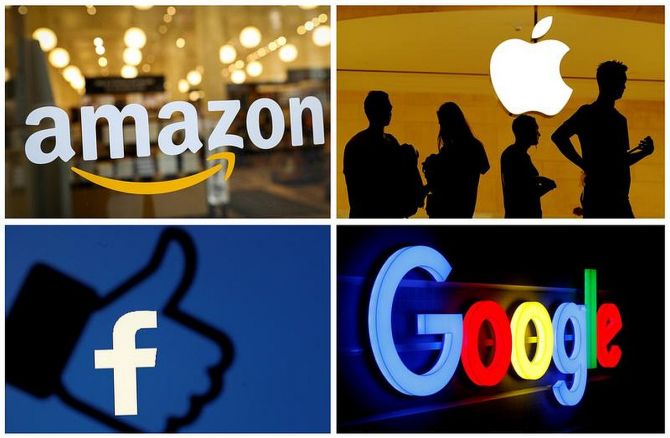Unleashing the Power of Innovation: A Spotlight on the 4 Big Tech Companies Shaping the Future

Introduction
In today’s fast-paced world, innovation has become the lifeblood of success for businesses across industries. And when it comes to shaping the future, there are 4 big tech companies that stand out from the crowd. These industry giants have not only revolutionized their respective fields but have also redefined the way we live, work, and connect with the world around us.
From pioneering search engines and transforming the way we access information to disrupting the transportation industry with their ride-hailing services, these companies have unleashed the power of innovation like no other. With their cutting-edge technologies, customer-centric approaches, and ambitious visions, they continue to push the boundaries of what’s possible.
In this article, we shine a spotlight on these four tech titans – their breakthrough products, their impact on our daily lives, and how they’re spearheading the future of technology. So, join us on this exhilarating journey as we delve into the world of innovation and explore how these companies are shaping the future landscape of technology and beyond.
The Importance of Innovation in the Tech Industry
Innovation is the driving force behind progress in the tech industry. It is the catalyst that propels companies forward, enabling them to develop groundbreaking products and services that meet the evolving needs of consumers. In today’s hyper-competitive market, companies that fail to innovate risk becoming obsolete.
The four big tech companies we are focusing on – Apple, Google, Amazon, and Facebook – have all demonstrated their commitment to innovation in various ways. They have not only disrupted existing industries but have also created entirely new markets, setting the stage for future advancements.
Apple: A History of Innovation
Apple is synonymous with innovation. From the introduction of the Macintosh in 1984 to the revolutionizing of the music industry with the iPod and iTunes, Apple has consistently pushed the boundaries of what’s possible. Their commitment to design and user experience has made their products iconic and sought after by millions around the world.
The iPhone, introduced in 2007, changed everything. It not only redefined the smartphone market but also transformed the way we interact with technology. With its sleek design, intuitive interface, and a multitude of powerful features, the iPhone set a new standard for mobile devices. Apple’s App Store also revolutionized the way we access and download apps, creating a vibrant ecosystem of developers and entrepreneurs.
Apple’s innovation extends beyond hardware. They have been at the forefront of software advancements with their operating systems, macOS and iOS, constantly introducing new features and improvements. The introduction of Siri, their intelligent personal assistant, marked a significant step forward in the integration of artificial intelligence into everyday devices.
Google: Revolutionizing Search and Beyond
When it comes to innovation in the world of search engines, Google is the undisputed leader. Founded in 1998, Google revolutionized the way we access information by developing a search algorithm that provided highly relevant and accurate results. Their commitment to delivering the best user experience led to the creation of a simple, clean interface that quickly became synonymous with search.
But Google didn’t stop at search. They expanded into various other areas, continuously pushing the boundaries of what’s possible. Google Maps revolutionized navigation and made it easier for people to explore the world. Google Translate broke down language barriers, enabling real-time translation. And with the introduction of Google Photos, they revolutionized the way we store and organize our memories.
Google’s commitment to innovation is evident in their ambitious projects. From self-driving cars to the development of artificial intelligence with DeepMind, Google continues to push the limits of technology. Their focus on machine learning and data analysis has also led to advancements in healthcare, with projects like Google Health aiming to improve patient outcomes through data-driven solutions.
Amazon: From Online Bookstore to Everything Store
What started as an online bookstore in 1994 has transformed into the world’s largest e-commerce platform. Amazon’s commitment to innovation and customer-centricity has been instrumental in their success. They disrupted the retail industry by offering a vast selection of products, competitive prices, and fast shipping, all backed by a seamless customer experience.
But Amazon’s innovation extends beyond e-commerce. They have revolutionized the way we consume media with their Kindle e-readers and Fire TV streaming devices. Amazon Web Services (AWS) has transformed the cloud computing industry, providing scalable and affordable infrastructure for businesses of all sizes. And with initiatives like Amazon Prime, they have redefined the concept of subscription-based services.
Amazon’s commitment to innovation is also evident in their logistics and delivery operations. They are constantly exploring new technologies, such as drone delivery and autonomous vehicles, to improve the efficiency and speed of their operations. Their vision of delivering packages to customers within hours of ordering has the potential to reshape the entire logistics industry.
Facebook: Connecting the World
Facebook’s mission is to bring the world closer together, and they have certainly achieved that through their innovative social networking platform. Founded in 2004, Facebook has transformed the way we connect and communicate with others. It has become an integral part of our daily lives, enabling us to share moments, stay connected with friends and family, and discover new communities.
But Facebook’s innovation goes beyond social networking. They have acquired several companies, such as Instagram and WhatsApp, expanding their reach and capabilities. Instagram revolutionized the way we share and consume visual content, while WhatsApp transformed the way we communicate globally. Facebook’s Oculus VR division is also pushing the boundaries of virtual reality, aiming to create immersive experiences for users.
Facebook’s commitment to innovation is not without its challenges. They have faced criticism for privacy concerns and the spread of misinformation on their platform. However, they are actively working to address these issues and are investing in technologies like artificial intelligence to detect and mitigate harmful content.
Key Innovations from Each Company
Apple, Google, Amazon, and Facebook have introduced numerous innovations that have reshaped industries and transformed our lives. Here are some key innovations from each company:
- Apple: The iPhone, App Store, Siri, Macintosh, iPod, and iTunes.
- Google: Search engine, Google Maps, Google Translate, Google Photos, and self-driving cars.
- Amazon: E-commerce platform, Kindle, Fire TV, Amazon Web Services (AWS), and drone delivery.
- Facebook: Social networking platform, Facebook Messenger, Instagram, WhatsApp, and Oculus VR.
These innovations have not only brought convenience and new experiences to consumers but have also created new opportunities for businesses and entrepreneurs. They have reshaped entire industries, disrupted traditional business models, and paved the way for future advancements.
Impact of These Innovations on Society
The innovations introduced by Apple, Google, Amazon, and Facebook have had a profound impact on society. They have transformed the way we live, work, and connect with each other. Here are some of the ways these innovations have influenced our daily lives:
- Communication: Facebook’s social networking platform and messaging apps like WhatsApp have made it easier for us to stay connected with friends and family, regardless of distance. We can share moments, exchange messages, and participate in communities from the comfort of our own homes.
- Access to Information: Google’s search engine has made information accessible to anyone with an internet connection. We can find answers to our questions, learn new skills, and stay informed about the world around us. The introduction of Google Translate has also broken down language barriers, enabling us to communicate and access information in different languages.
- Entertainment: Apple’s iPhone and the App Store have revolutionized the way we consume entertainment. We can access a vast library of apps, games, movies, and music, all from the palm of our hands. Amazon’s Kindle and Fire TV have also transformed the way we read books and stream content, providing us with endless options for entertainment.
- Commerce: Amazon’s e-commerce platform has made shopping more convenient and accessible. We can browse and purchase a wide range of products, read reviews, and have them delivered to our doorstep within days or even hours. This has not only changed the way we shop but has also disrupted traditional brick-and-mortar retail.
- Productivity: Apple’s Macintosh and Google’s suite of productivity tools, such as Google Docs and Google Drive, have transformed the way we work. We can collaborate with others, store and access files from anywhere, and increase our productivity. Amazon Web Services (AWS) has also provided businesses with scalable and cost-effective infrastructure, enabling them to innovate and grow.
These innovations have undoubtedly made our lives more convenient, connected, and efficient. They have opened up new possibilities, democratized access to information, and empowered individuals and businesses alike.
Challenges and Criticisms Faced by These Companies
Despite their groundbreaking innovations and immense success, Apple, Google, Amazon, and Facebook have not been without their fair share of challenges and criticisms. Here are some of the key issues they have faced:
- Privacy Concerns: All four companies have faced scrutiny over their handling of user data and privacy. From Facebook’s Cambridge Analytica scandal to Apple’s battle with the FBI over unlocking iPhones, these companies have had to navigate complex privacy issues and rebuild trust with their users.
- Monopoly and Anti-Competitive Practices: Google and Amazon, in particular, have faced accusations of anti-competitive behavior and monopolistic practices. Google has been fined by the European Union for favoring its own services in search results, while Amazon has been criticized for using its platform to disadvantage third-party sellers.
- Spread of Misinformation and Hate Speech: Facebook has come under fire for its role in the spread of misinformation and hate speech on its platform. They have faced criticism for not doing enough to address these issues and for allowing harmful content to thrive.
- Labor Practices: Amazon has faced criticism for its treatment of workers, with allegations of poor working conditions, low wages, and anti-union tactics. They have also faced scrutiny over the impact of their logistics operations on the environment.
These challenges highlight the complexities and responsibilities that come with being industry leaders. These companies are not immune to criticism, and they must continually adapt and improve their practices to address these concerns and maintain the trust of their users and stakeholders.
Conclusion: The Future of Innovation in the Tech Industry
The 4 big tech companies – Apple, Google, Amazon, and Facebook – have demonstrated the power of innovation in shaping the future. Their breakthrough products and services have transformed industries, connected people around the world, and opened up new possibilities.
As we look to the future, it’s clear that innovation will continue to be the driving force behind progress in the tech industry. The rapid advancements in technologies like artificial intelligence, machine learning, and blockchain present new opportunities and challenges. Companies that embrace these technologies and prioritize innovation will be well-positioned to shape the future landscape of technology and beyond.
But innovation must also be accompanied by a commitment to ethical practices, privacy protection, and social responsibility. As these companies continue to push the boundaries of what’s possible, they must also address the challenges and criticisms they face, ensuring that the benefits of innovation are shared by all.
So, let us celebrate the power of innovation and the impact it has on our lives. Let us embrace the advancements brought forth by Apple, Google, Amazon, and Facebook, and eagerly anticipate the exciting possibilities that the future holds. Together, we can shape a future where innovation serves as a catalyst for progress and a force for good.



